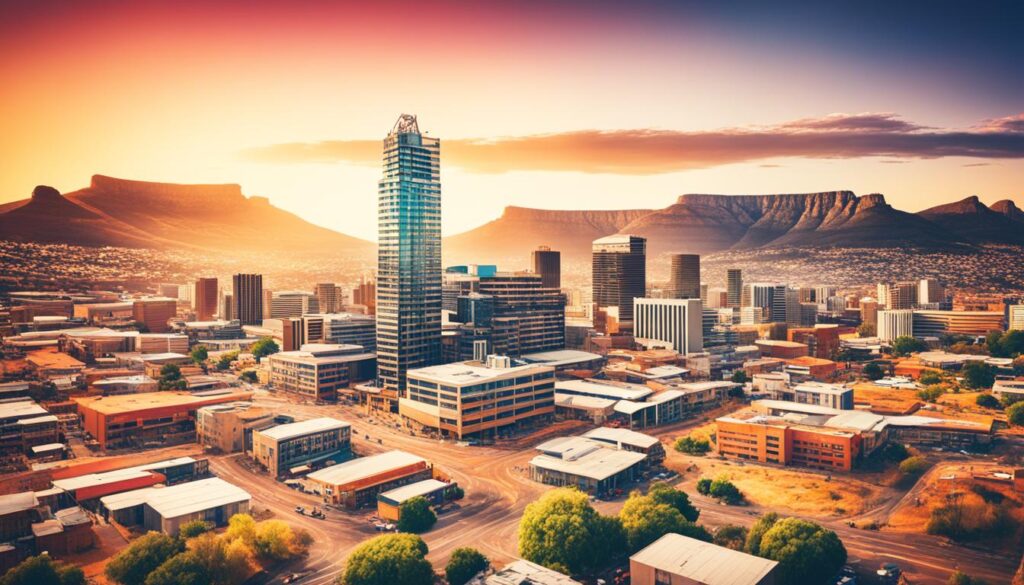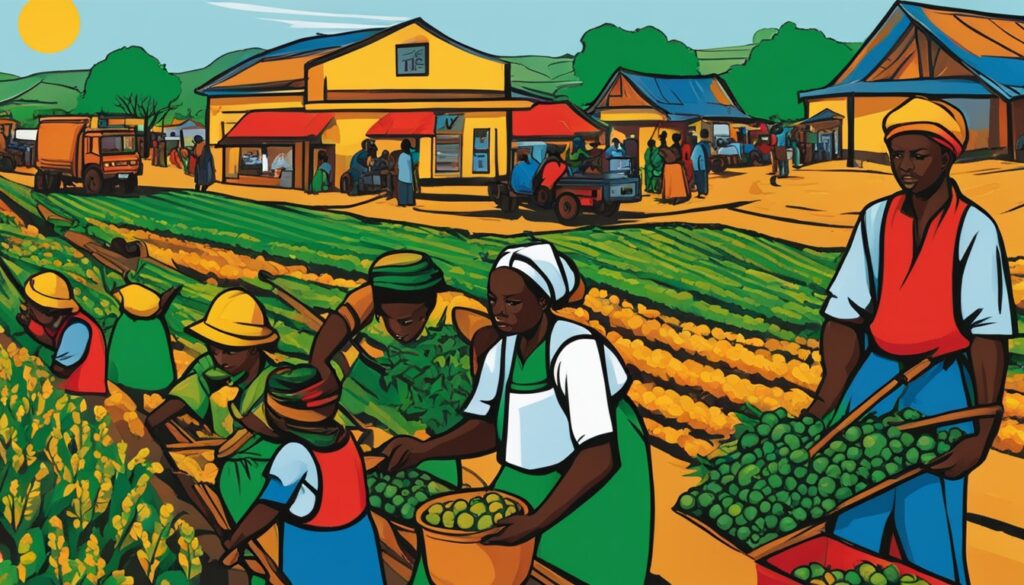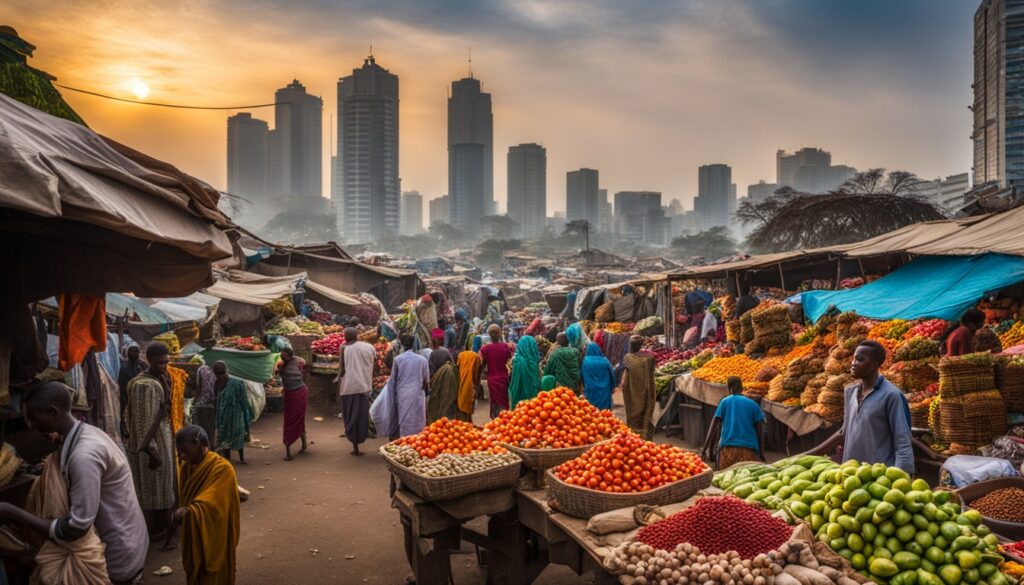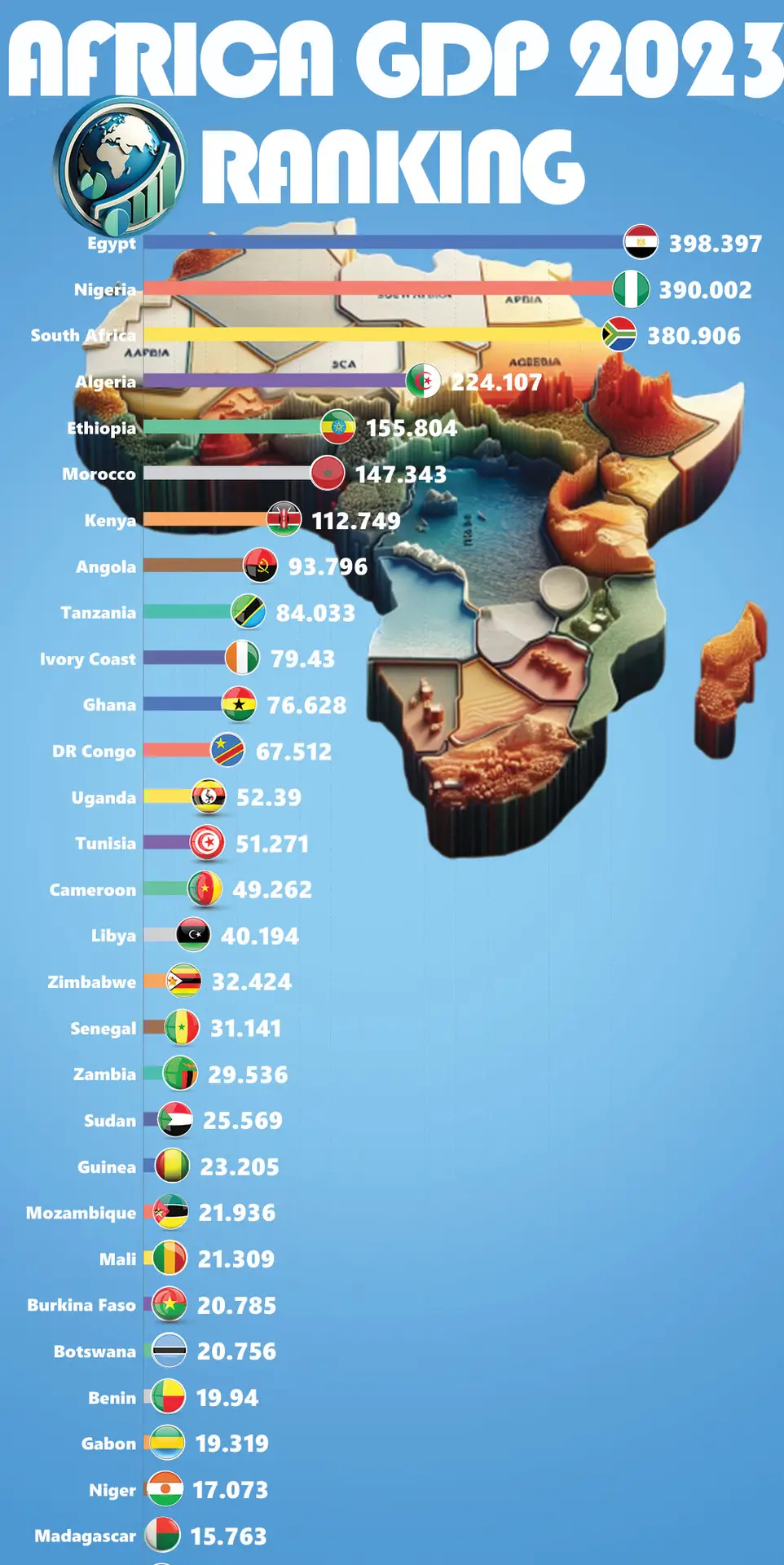The African continent has many different economies with their strengths and challenges. The International Monetary Fund sorts African countries by their GDP. This is the total value of final goods and services produced in a year.1 The final list can change yearly due to currency exchange rate changes. Although these changes might not affect how people live.
Key Takeaways
- Africa is home to some of the world’s largest and most dynamic economies, led by powerhouses like South Africa, Egypt, and Algeria.
- Nigeria, the continent’s most populous country, is the fourth-largest economy in Africa, with a projected 2024 nominal GDP of $252.738 billion.
- Ethiopia has emerged as one of the fastest-growing economies in Africa, with a projected 2024 nominal GDP of $205.130 billion.
- The economic landscape of Africa is diverse, with a mix of traditional powerhouses and rising economic hotspots like Morocco and Kenya.
- Infrastructure deficiencies and political instability remain key challenges that must be addressed for continued economic growth and development in Africa.
Introduction to African Economic Giants
Gross domestic product (GDP) tells us the value of goods and services a country makes. It’s a key number for comparing nations’ economies.1 Yet, using just GDP to compare national wealth has some issues. One is it ignores the cost of living differences between countries. That’s where purchasing power parity (PPP) comes in. PPP adjusts for these differences, giving a clearer picture of living standards.1
| Rank | Country | Nominal GDP (Billion US$ | Per Capita (US$) |
|---|---|---|---|
| 1 | Egypt | 398.397 | 3,770.133 |
| 2 | Nigeria | 390.002 | 1,755.326 |
| 3 | South Africa | 380.906 | 6,190.742 |
| 4 | Algeria | 224.107 | 4,874.706 |
| 5 | Ethiopia | 155.804 | 1,473.360 |
| 6 | Morocco | 147.343 | 3,979.871 |
| 7 | Kenya | 112.749 | 2,187.648 |
| 8 | Angola | 93.796 | 2,550.001 |
| 9 | Tanzania | 84.033 | 1,326.634 |
| 10 | Ivory Coast | 79.430 | 2,728.079 |
| 11 | Ghana | 76.628 | 2,328.970 |
| 12 | Democratic Republic of the Congo | 67.512 | 675.477 |
| 13 | Uganda | 52.390 | 1,163.034 |
| 14 | Tunisia | 51.271 | 4,190.603 |
| 15 | Cameroon | 49.262 | 1,721.954 |
| 16 | Libya | 40.194 | 5,872.222 |
| 17 | Zimbabwe | 32.424 | 2,005.875 |
| 18 | Senegal | 31.141 | 1,714.653 |
| 19 | Zambia | 29.536 | 1,435.890 |
| 20 | Sudan | 25.569 | 533.845 |
| 21 | Guinea | 23.205 | 1,542.757 |
| 22 | Mozambique | 21.936 | 647.135 |
| 23 | Mali | 21.309 | 912.643 |
| 24 | Burkina Faso | 20.785 | 888.029 |
| 25 | Botswana | 20.756 | 7,758.371 |
| 26 | Benin | 19.940 | 1,449.112 |
| 27 | Gabon | 19.319 | 8,831.823 |
| 28 | Niger | 17.073 | 630.800 |
| 29 | Madagascar | 15.763 | 529.560 |
| 30 | Mauritius | 14.819 | 11,751.506 |
| 31 | Republic of the Congo Republic of Congo | 14.407 | 2,857.614 |
| 32 | Rwanda | 13.927 | 1,031.692 |
| 33 | Malawi | 13.176 | 579.701 |
| 34 | Namibia | 12.647 | 4,785.679 |
| 35 | Chad | 12.596 | 702.845 |
| 36 | Somalia | 11.515 | 717.406 |
| 37 | Mauritania | 10.357 | 2,337.914 |
| 38 | Equatorial Guinea | 10.041 | 6,502.187 |
| 39 | Togo | 9.111 | 1,004.466 |
| 40 | South Sudan | 6.267 | 417.438 |
| 41 | Liberia | 4.347 | 800.213 |
| 42 | Djibouti | 3.873 | 3,761.241 |
| 43 | Sierra Leone | 3.519 | 414.962 |
| 44 | Burundi | 3.190 | 245.811 |
| 45 | Central African Republic | 2.760 | 539.240 |
| 45 | Cape Verde | 2.598 | 4,502.784 |
| 46 | The Gambia | 2.388 | 903.293 |
| 47 | Seychelles | 2.085 | 20,889.545 |
| 48 | Guinea-Bissau | 1.991 | 1,028.223 |
| 49 | Eritrea | 1.982 (2019)[6] | 566.731 (2019)[6] |
| 51 | Comoros | 1.364 | 1,377.022 |
| — | Total | 2,869.235 | 2,029.242 |
Gross Domestic Product as an Economic Indicator
GDP is a critical way to measure the economic strength of African nations.1 The economic strength of African countries depends on several things. These include their natural resources, how well their infrastructure is developed, how stable their politics are, and how varied their economy is.1
Africa’s Economic Powerhouses
Africa has seen impressive economic growth over the past decade, with several countries emerging as economic powerhouses on the continent. A number of factors like natural resource exports, foreign investment, and policy reforms have driven this growth. While challenges like poverty and inequality remain, the future looks bright for many African economies.
Factors Influencing Economic Prowess in Africa
GDP is just one part of Africa’s economic story. Other things matter a lot, too. The mix of natural resources, how good the infrastructure is, political peace, and economic variety are vital. They all help shape African countries’ economic strength.1
South Africa: The Powerhouse of Africa
South Africa leads Africa’s economy. By 2024, it may top all others with a GDP of $373.233 billion. This makes up 13.2% of Africa’s total economy.1
It’s known for its strong industries like mining, manufacturing, finance, and tourism. This diverse economy and solid infrastructure help it stay ahead.

The south africa economy keeps growing strong. The gdp of south africa is getting bigger every year. This growth is thanks to key areas like infrastructure and financial services.
Egypt: A Dominant Force in North Africa
Egypt plays a huge role in Africa’s economy. By 2024, it’s set to be the second-largest on the continent, with a value of $347.594 billion. Its economy is strong and diverse, touching on agriculture, manufacturing, tourism, and energy.2
Egypt’s Economic Sectors
Agriculture is a big part of Egypt’s economy, making up 11% of its GDP. It also employs a lot of people, nearly a quarter of the working population. This is higher than the average in the Middle East and North Africa.3 In steel, Egypt leads in Africa and ranks 21st in the world by production volume. Furthermore, the auto industry is growing with new local assembly plants. An agreement was also made to produce electric cars, aiming for 25,000 units yearly by 2021.3
Challenges Facing the Egyptian Economy
Egypt’s economy faces some tough hurdles too, like political ups and downs, high unemployment, and a large deficit. Understanding these issues helps to see the state of the labor market and financial stability.4 Tackling these problems is vital for Egypt to stay a powerhouse in North Africa.
Algeria: A Hydrocarbon-Fueled Economy
Algeria in Africa comes third in size economically. It relies a lot on oil and gas. These industries are a big part of its money and what it sells to other countries.5 Algeria is actually tenth in the world for natural gas. It’s the fourth biggest exporter of gas globally, too.5 In terms of gases in the ground that aren’t being used yet, Algeria is third.5 For oil that’s already proven to be there, it ranks sixteenth.5 Relying so heavily on these resources has helped Algeria’s economy. But it also means the country is very affected by sudden changes in global oil and gas prices.
Between 2016 and 2021, Algeria’s gas and oil business made up 19% of everything the country made. Almost all of what Algeria sold to other countries was related to gas and oil during this time.6 This part of their economy also filled 38% of their budget. While their gas and oil part has been doing well, the rest of the money making in Algeria faced tough times. The overall money the country made actually went down by 5.1% in 2020. But the following year, 2021, it bounced back up by 3.4%.6 There’s good news, though. Other areas not connected to gas and oil have started to do better. In the first nine months of 2022, these other sectors grew by 3.7%.
In Algeria, most of the work in the oil and gas field is done by a company called Sonatrach. It’s owned by the government and does around 80% of this work. Companies from outside Algeria, known as International Oil Companies (IOCs), do the remaining 20%.5 For natural gas in 2022, Algeria made 108,667 million cubic meters. It sent 65,330 million cubic meters to other countries. This left 43,337 million cubic meters for Algeria’s use at home.5 When it comes to oil, Algeria made 1,057 thousand barrels every day in 2022. Worldwide, the total need for oil was 635.9 thousand barrels a day.5
The country is now wanting to use more new ways to make money than just oil and gas. The plan is to use these new ways more and more. Since 2020, the Algerian government has put out new rules and plans to welcome more investing, both from inside the country and out. The plan for 2021 was all about this change.6 They’re also planning to make 40% of their own power from clean, renewable energy by 2030. Sun power, or solar energy, is what they’re focusing on the most.7
| Key Hydrocarbon Statistics for Algeria | Value |
|---|---|
| Global Rank in Natural Gas Reserves | 10th5 |
| Global Rank in Gas Exporting | 4th5 |
| Global Rank in Shale Gas Resources | 3rd5 |
| Global Rank in Proven Oil Reserves | 16th5 |
| Percentage of Oil Exports in Total Production | 60%5 |
| Percentage of Hydrocarbon Production by Sonatrach | 80%5 |
| Total Local Natural Gas Production in 2022 | 108,667 million cubic meters5 |
| Natural Gas Exports in 2022 | 65,330 million cubic meters5 |
| Domestic Natural Gas Market Size in 2022 | 43,337 million cubic meters5 |
| Crude Oil Production in 2022 | 1,057 thousand barrels per day5 |
| Total Oil Market Size in 2022 | 635.9 thousand barrels per day5 |
| Exchange Rate (Algerian Dinar to US Dollar) in 2023 | 145.525 |
The Algerian economy still mostly depends on oil and gas. But, the government wants to make other parts of the economy grow bigger. They’re working to make it less about oil and gas. With a lot of new gas and oil still in the ground, and a big interest in clean energy, Algeria has a chance to stay important in Africa’s money business.57
Nigeria: The Largest Economy in Africa
Nigeria holds the title of being Africa’s biggest economy. It’s expected to reach a GDP of $252.738 billion by 2024.1 This makes up 9% of Africa’s total economic activity. Nigeria’s economy covers many areas like farming, oil, manufacturing, and services. The nation is working hard to depend less on oil and gas, which can be unsure.1
Nigeria’s Diverse Economic Base
More than 7 million farmers in Nigeria have begun using new technology for farming.8 This has boosted the country’s tomato and rice farming. In 2019, 26% of tomatoes and 14.27% of rice produced in Nigeria came from these farmers.8 Cassava, rice, sorghum, and tomato farming are doing very well. Farmers are making good sales and earning significant profits. This shows that farming in Nigeria has a bright future.8
The manufacturing and services areas are growing in Nigeria. The nation is moving away from just focusing on oil and gas.1 But, Nigeria faces issues like not having enough good roads, corruption, and political problems. These can slow down its economic growth.1

Ethiopia: Africa’s Rapidly Growing Economy
Ethiopia is quickly becoming a major player in Africa’s economy. It’s expected to reach a GDP of $205.130 billion by 2024, ranking it as the fifth largest on the continent.9 This growth is due to heavy investments in roads, buildings, and energy, plus more factories and services opening.9 Even though there are still some tough problems to solve, like too many people out of work and not exporting enough, Ethiopia is clearly on its way up.10
Currently, Ethiopia’s economy is set to grow by 8.5% this year. Over the past ten years, it’s been growing at an average of 10% each year.10 The goal for the country is to have a better off economy by 2025, with $1,020 income per person.9 With more than 126.5 million people, Ethiopia is Africa’s second most populated country, after Nigeria.9
Most of Ethiopia’s people work in farming, and luckily, this area hasn’t been too harmed by the recent pandemic.9 The number of people living in poverty went down from 30% in 2011 to 24% in 2016.9 But, there are still major concerns with the education of kids, with a lot of them not getting the chance to learn.9 Ethiopia is also challenged to create enough good jobs for the nearly two million young people who join the job market every year.9
Changing weather patterns due to climate change is expected to hurt Ethiopia’s economy by 1-1.5% every year.9 This could get as bad as 5% by the 2040s, putting even more people into poverty.9 Yet, there’s hope in farming. The country has a chance to sell more farm products abroad than it buys.9

The Largest Economies in Africa
Ranking by Nominal GDP
As of 2024, the top 10 largest economies in Africa by nominal GDP look like this:1
- South Africa ($373.233 billion)
- Egypt ($347.594 billion)
- Algeria ($266.780 billion)
- Nigeria ($252.738 billion)
- Ethiopia ($205.130 billion)
- Morocco ($152.377 billion)
- Kenya ($104.001 billion)
- Angola ($92.123 billion)
- Côte d’Ivoire ($86.911 billion)
- Tanzania ($79.605 billion)
Purchasing Power Parity (PPP) GDP Rankings
The top 5 countries in Africa by GDP (Nominal) in 2024, in billion US$ and per capita (US$) are:1
| Country | GDP (Nominal) in Billion US$ | Per Capita (US$) |
|---|---|---|
| 1. South Africa | $373.233 | $5,975 |
| 2. Egypt | $347.594 | $3,225 |
| 3. Algeria | $266.780 | $5,722 |
| 4. Nigeria | $252.738 | $1,110 |
| 5. Ethiopia | $205.130 | $1,910 |
The total GDP (Nominal) for all African countries in 2024 is $2,819.317 billion, with a per capita value of $1,942.307.1
Emerging Economic Hotspots in Africa
Africa is seeing growth not just in its big economies. There are new spots becoming economic leaders too.11
Morocco: A Stable North African Economy
Morocco is becoming known for its stable economy. It’s expected to have a GDP of $152.377 billion by 2024, ranking the country sixth on the continent.11 This North African nation shows increasing economic strength, thanks to major projects and more businesses operating there.
Kenya: East Africa’s Economic Powerhouse
Kenya stands out as East Africa’s economic giant. It’s set to have a GDP of $104.001 billion by 2024, ranking seventh in Africa.11 Kenya’s growth is powered by improving its roads, attracting foreign money, and making its economy more varied. Areas like farming, making things, and services are especially growing.
Challenges Facing Africa’s Economic Growth
Africa has seen big economic improvements in many countries. Yet, it still meets challenges that slow growth and development.12 In 2022 and 2023, Africa’s economy is expected to grow by 2.7% and 2.4%. This is after a 5.1% improvement in 2021. However, issues are still big.12 A report states that 58 million Africans might fall into extreme poverty in 2022.12 Plus, almost 60% of Africa’s poor countries have debt problems. More than 60% need help with food too.12
Infrastructure Deficiencies
Africa’s economic growth is held back by poor infrastructure. This includes not enough roads, railways, and power.12 With such lacking infrastructure, moving goods and services is hard. This leads to 33 countries needing food help from the UN.12 Fixing infrastructure is key to boosting Africa’s economy.
Political Instability and Corruption
Political turmoil and corruption are big challenges for Africa’s growth.12 Unstable politics scare off investors. It also messes up economic planning and uses up resources wrongly.12 Widespread corruption makes it worse. It kills trust in governments, slows down services, and stops fair business.
To get better, Africa needs to work on governance and cut corruption. It must make politics more stable everywhere.12
Conclusion
Africa is quickly becoming a major economic force, led by countries like Nigeria, South Africa, Egypt, Algeria, and Ethiopia. These nations are growing fast, with strong and varied economies. They rely on things like natural resources and services for their success.13 Unfortunately, Africa also deals with big problems like bad infrastructure and political troubles. Solving these issues is key to keeping the economic growth going.
Across Africa, new economic leaders are emerging. For instance, Morocco boasts a stable and diverse economy. Meanwhile, Kenya is shining as East Africa’s economic leader, enjoying continuous growth.
Boosting trade is crucial for Africa to reach its development goals. The AfCFTA must be put into action to make trade easier. But, this is not the only step needed. Africa must also find new ways to fund its growth, cut down poverty and inequality, and tackle unemployment. By making necessary changes and getting debt under control, African economies can grow stronger.13
FAQ
What is the largest economy in Africa?
In 2024, Nigeria leads Africa with a nominal GDP of 2.738 billion.
What are the top 10 largest economies in Africa by nominal GDP?
Here are the top 10 economies in Africa by GDP:
1. South Africa (3.233 billion)
2. Egypt (7.594 billion)
3. Algeria (6.780 billion)
4. Nigeria (2.738 billion)
5. Ethiopia (5.130 billion)
6. Morocco (2.377 billion)
7. Kenya (4.001 billion)
8. Angola (.123 billion)
9. Côte d’Ivoire (.911 billion)
10. Tanzania (.605 billion)
How is GDP used to measure economic performance and size of African nations?
GDP measures the value of goods and services a country makes. It lets us compare how well countries are doing. But, it doesn’t consider living costs in different places. This is where PPP comes in, giving a better view of living standards.
What are the key factors influencing the economic prowess of African nations?
The economic strength of African nations is greatly affected by their natural resources, how well their infrastructure is developed, how stable the government and political scene is, and how much they diversify their economy.
Why is South Africa considered the economic powerhouse of Africa?
South Africa shines in Africa due to its strong economy, mix of industries, good infrastructure, and advanced finance system. It’s set to top the GDP chart in Africa in 2024 at 3.233 billion. This is 13.2% of Africa’s economy.
What are the key sectors of the Egyptian economy?
Egypt’s economy focuses on farming, making things, hosting tourists, and producing energy. It’s been facing challenges like unstable politics, high unemployment, and big budget shortfalls.
How is the Algerian economy structured?
Algeria relies a lot on oil and gas, which are big parts of its economy and earn a lot when sold abroad. But, depending so much on energy makes it shaky when global energy prices swing.
What are the key sectors of the Nigerian economy?
Nigeria’s economy is mixed, with farming, oil and gas, making things, and services playing key parts. They are working to not rely as much on oil and gas, which can be up and down.
Why is Ethiopia considered one of the fastest-growing economies in Africa?
Ethiopia is moving fast in Africa, with a 2024 GDP of 5.130 billion, putting it in fifth place. It’s growing strong thanks to big investments in stuff like roads, more factories, and better services.
What are some of the challenges facing Africa’s economic growth?
Africa’s growth faces hurdles like not enough good roads, trains, and power lines. Also, politics being not steady and corruption scare off people that could bring in money. They can mess with plans to grow and take away from real work that would boost the economy.
Source Links
- https://en.wikipedia.org/wiki/List_of_African_countries_by_GDP_(nominal)
- https://en.wikipedia.org/wiki/Economy_of_Egypt
- https://www.oecd-ilibrary.org/sites/0628d72c-en/index.html?itemId=/content/component/0628d72c-en
- https://www.heritage.org/index/pages/country-pages/egypt
- https://www.trade.gov/country-commercial-guides/algeria-oil-and-gas-hydrocarbons
- https://www.worldbank.org/en/country/algeria/overview
- https://www.privacyshield.gov/ps/article?id=Algeria-Oil-and-Gas-Hydrocarbons
- https://www.worldbank.org/en/country/nigeria/overview
- https://www.worldbank.org/en/country/ethiopia/overview
- https://www.cnn.com/2018/04/24/africa/africa-largest-economy/index.html
- https://bigthink.com/strange-maps/richest-cities-in-africa/
- https://unctad.org/news/africas-economic-growth-decelerates-sharply
- https://www.uneca.org/stories/african-countries-to-dominate-the-world’s-top-10-growing-economies,-eca-report
- https://www.mckinsey.com/mgi/our-research/reimagining-economic-growth-in-africa-turning-diversity-into-opportunity
